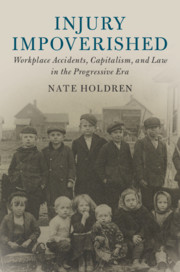(Source: CUP)
Cambridge University Press is publishing
a new book on workplace accidents and the law in the Progressive Era
(1890s-1920s) in the US.
ABOUT THE BOOK
The late nineteenth- and early
twentieth-century US economy maimed and killed employees at an astronomically
high rate, while the legal system left the injured and their loved ones with
little recourse. In the 1910s, US states enacted workers' compensation laws,
which required employers to pay a portion of the financial costs of workplace
injuries. Nate Holdren uses a range of archival materials, interdisciplinary
theoretical perspectives, and compelling narration to criticize the
shortcomings of these laws. While compensation laws were a limited improvement
for employees in economic terms, Holdren argues that these laws created new
forms of inequality, causing people with disabilities to lose their jobs, while
also resulting in new forms of inhumanity. Ultimately, this study raises
questions about law and class and about when and whether our economy and our
legal system produce justice or injustice.
ABOUT THE AUTHOR
Nate Holdren, Drake
University, Iowa
Nate Holdren is Assistant
Professor in Law, Politics and Society at Drake University, Iowa.
TABLE OF CONTENTS
Introduction: injuries and
abstractions
Part I. The Eclipse of
Recognition and The Rise of The Tyranny of The Table:
1. Commodification and
recognition within the tyranny of the trial
2. Injury impoverished
3. Suffering and the price of
life and limb
Interlude: trampler and
tramped-on in the Cherry Mine fire
Part II. New Machineries of
Injustice:
4. The disabling power of law and
market
5. Insuring injustice
6. Discrimination technicians and
human weeding
Conclusion: resistance and
aftermath
Coda: narrative, machinery, law.
More info here


No comments:
Post a Comment
Note: Only a member of this blog may post a comment.